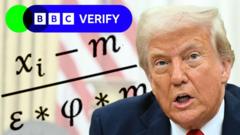In the fallout of President Trump's new tariffs, U.S. stock markets suffered significant losses, while reactions from international leaders indicated a readiness to combat the tariff measures, highlighting the potential for escalating trade tensions.
Global Financial Markets React to Trump's Tariff Announcement

Global Financial Markets React to Trump's Tariff Announcement
The latest round of tariffs imposed by President Trump has sent shockwaves through financial markets, igniting potential retaliatory measures from allies and impacting global trade.
The U.S. stock market faced a major downturn following President Trump's announcement of new tariffs on imports, marking its steepest decline since the pandemic's onset. The S&P 500 dropped by 4.8 percent, shocking investors and triggering widespread selling, particularly within the tech sector, where companies like Apple experienced a loss of about 9 percent.
Internationally, the reaction was swift as European leaders positioned themselves against the tariffs, particularly after a striking 20 percent tariff was imposed on European imports. European Commission President Ursula von der Leyen conveyed a unified front, stating, "If you take on one of us, you take on all of us." Countries such as China, now facing an imposing 34 percent tariff, expressed intentions to protect their trade interests through countermeasures.
In Canada, Prime Minister Mark Carney announced a retaliatory 25 percent tariff on automotive imports, calling for a new global trading framework that does not rely on the U.S. President Claudia Sheinbaum of Mexico also highlighted plans to bolster domestic industries in response to the tariffs, aiming to mitigate adverse economic impacts on her country.
French President Emmanuel Macron advocated for European companies to halt investments in the U.S. until the tariff situation comes into focus, further intensifying potential trade conflicts. As nations deliberate their next moves in light of this new tariff landscape, the global trading system appears poised for turbulent adjustments ahead.
Internationally, the reaction was swift as European leaders positioned themselves against the tariffs, particularly after a striking 20 percent tariff was imposed on European imports. European Commission President Ursula von der Leyen conveyed a unified front, stating, "If you take on one of us, you take on all of us." Countries such as China, now facing an imposing 34 percent tariff, expressed intentions to protect their trade interests through countermeasures.
In Canada, Prime Minister Mark Carney announced a retaliatory 25 percent tariff on automotive imports, calling for a new global trading framework that does not rely on the U.S. President Claudia Sheinbaum of Mexico also highlighted plans to bolster domestic industries in response to the tariffs, aiming to mitigate adverse economic impacts on her country.
French President Emmanuel Macron advocated for European companies to halt investments in the U.S. until the tariff situation comes into focus, further intensifying potential trade conflicts. As nations deliberate their next moves in light of this new tariff landscape, the global trading system appears poised for turbulent adjustments ahead.





















